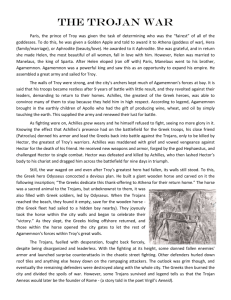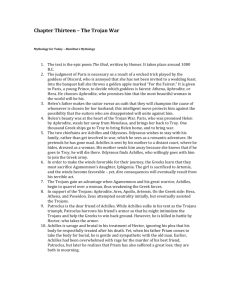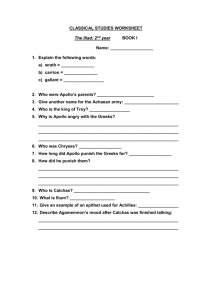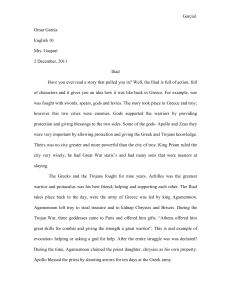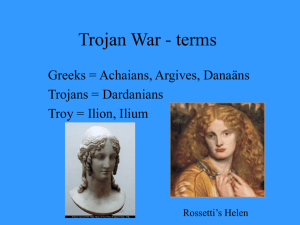238810_iliad_in_short
advertisement
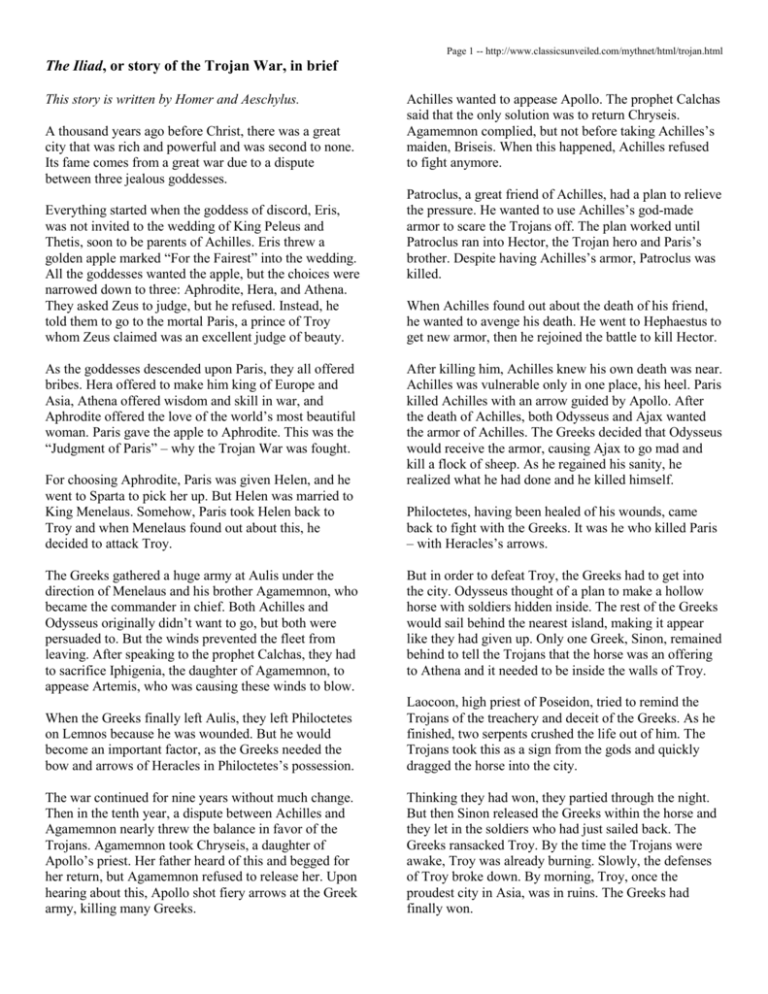
Page 1 -- http://www.classicsunveiled.com/mythnet/html/trojan.html The Iliad, or story of the Trojan War, in brief This story is written by Homer and Aeschylus. A thousand years ago before Christ, there was a great city that was rich and powerful and was second to none. Its fame comes from a great war due to a dispute between three jealous goddesses. Everything started when the goddess of discord, Eris, was not invited to the wedding of King Peleus and Thetis, soon to be parents of Achilles. Eris threw a golden apple marked “For the Fairest” into the wedding. All the goddesses wanted the apple, but the choices were narrowed down to three: Aphrodite, Hera, and Athena. They asked Zeus to judge, but he refused. Instead, he told them to go to the mortal Paris, a prince of Troy whom Zeus claimed was an excellent judge of beauty. As the goddesses descended upon Paris, they all offered bribes. Hera offered to make him king of Europe and Asia, Athena offered wisdom and skill in war, and Aphrodite offered the love of the world’s most beautiful woman. Paris gave the apple to Aphrodite. This was the “Judgment of Paris” – why the Trojan War was fought. For choosing Aphrodite, Paris was given Helen, and he went to Sparta to pick her up. But Helen was married to King Menelaus. Somehow, Paris took Helen back to Troy and when Menelaus found out about this, he decided to attack Troy. The Greeks gathered a huge army at Aulis under the direction of Menelaus and his brother Agamemnon, who became the commander in chief. Both Achilles and Odysseus originally didn’t want to go, but both were persuaded to. But the winds prevented the fleet from leaving. After speaking to the prophet Calchas, they had to sacrifice Iphigenia, the daughter of Agamemnon, to appease Artemis, who was causing these winds to blow. Achilles wanted to appease Apollo. The prophet Calchas said that the only solution was to return Chryseis. Agamemnon complied, but not before taking Achilles’s maiden, Briseis. When this happened, Achilles refused to fight anymore. Patroclus, a great friend of Achilles, had a plan to relieve the pressure. He wanted to use Achilles’s god-made armor to scare the Trojans off. The plan worked until Patroclus ran into Hector, the Trojan hero and Paris’s brother. Despite having Achilles’s armor, Patroclus was killed. When Achilles found out about the death of his friend, he wanted to avenge his death. He went to Hephaestus to get new armor, then he rejoined the battle to kill Hector. After killing him, Achilles knew his own death was near. Achilles was vulnerable only in one place, his heel. Paris killed Achilles with an arrow guided by Apollo. After the death of Achilles, both Odysseus and Ajax wanted the armor of Achilles. The Greeks decided that Odysseus would receive the armor, causing Ajax to go mad and kill a flock of sheep. As he regained his sanity, he realized what he had done and he killed himself. Philoctetes, having been healed of his wounds, came back to fight with the Greeks. It was he who killed Paris – with Heracles’s arrows. But in order to defeat Troy, the Greeks had to get into the city. Odysseus thought of a plan to make a hollow horse with soldiers hidden inside. The rest of the Greeks would sail behind the nearest island, making it appear like they had given up. Only one Greek, Sinon, remained behind to tell the Trojans that the horse was an offering to Athena and it needed to be inside the walls of Troy. When the Greeks finally left Aulis, they left Philoctetes on Lemnos because he was wounded. But he would become an important factor, as the Greeks needed the bow and arrows of Heracles in Philoctetes’s possession. Laocoon, high priest of Poseidon, tried to remind the Trojans of the treachery and deceit of the Greeks. As he finished, two serpents crushed the life out of him. The Trojans took this as a sign from the gods and quickly dragged the horse into the city. The war continued for nine years without much change. Then in the tenth year, a dispute between Achilles and Agamemnon nearly threw the balance in favor of the Trojans. Agamemnon took Chryseis, a daughter of Apollo’s priest. Her father heard of this and begged for her return, but Agamemnon refused to release her. Upon hearing about this, Apollo shot fiery arrows at the Greek army, killing many Greeks. Thinking they had won, they partied through the night. But then Sinon released the Greeks within the horse and they let in the soldiers who had just sailed back. The Greeks ransacked Troy. By the time the Trojans were awake, Troy was already burning. Slowly, the defenses of Troy broke down. By morning, Troy, once the proudest city in Asia, was in ruins. The Greeks had finally won. Page 2 -- http://www.classicsunveiled.com/mythnet/html/trojan.html


